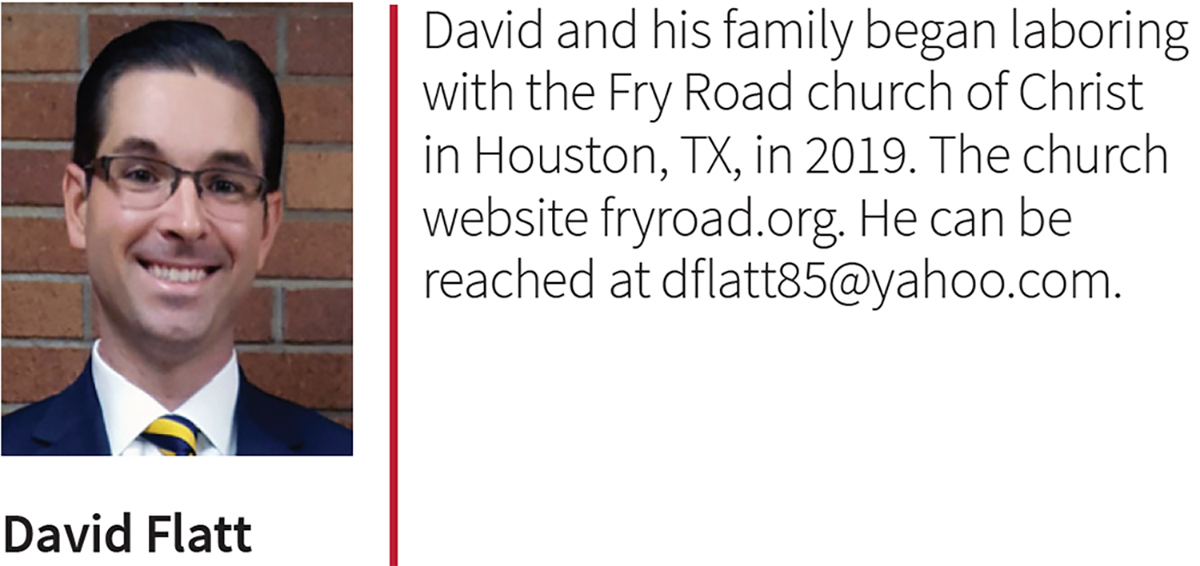
by David Flatt
Synopsis: In this final article, David concludes his examination of Paul’s epistle to the Romans. We thank brother Flatt for the excellent articles that he has submitted over the past 4+ years. His contributions have been greatly appreciated.
In the last chapter of Romans, Paul identifies an extensive list of names. The only list of comparable length is found in Colossians 4. Some may be tempted to ignore this collection of strange names. However, this list gives clues into the fascinating dynamic of saints and churches in Rome.
Paul identifies over twenty names and one unnamed woman: Rufus's mother. We know more about some than others. We know little about Aristobulus and Narcissus. Scholarly opinions differ on whether they were Christians. Paul refers to them as heads of large households, many of which contained Christians. Also, Priscilla and Aquila are identified. First mentioned in Acts 18, having been exiled from Rome, they went to Corinth where they met Paul. By the time the apostle wrote this letter, the couple had returned to Rome after Emperor Nero eased Claudius's expulsion order.
This exhaustive list demonstrates Paul's love for these saints. He looked forward to seeing them. While Paul had not been to Rome, he had crossed paths with these saints in their respective works. Christians who have traveled in the work of evangelism can appreciate the rich relationships that result from their labors.
This list of names gives us a sense of the dynamic of the saints and churches in Rome. Five or more churches met in the homes of some of the saints listed: (1) Priscilla and Aquila, (2) Aristobulus and Narcissus, (3) people with Asyncritus and the others in verse fourteen, (4) those with Philologus, and (5) the others in verse fifteen.
This section concludes with Paul telling them to "greet one another with a holy kiss." Much has been discussed about this kiss. If we understand the dynamic of the saints in Rome meeting in several churches in homes, this could be Paul's way of telling these churches to extend fellowship to one another. This coincides with Paul's purpose of uniting saints by faith in Christ (Rom. 14-15).
Lastly, one striking feature of Paul's personal greetings is the importance of women in the work of evangelism. Paul begins this list by recommending a woman: Phoebe. She did not live in Rome, but rather in Cenchrea, the port seven miles east of Corinth. Perhaps this is where Paul stayed when he wrote this letter.
Phoebe had been an essential help to Paul and many other saints. She is described as being a helper, patron, and or benefactor (translations vary), indicating that she was more than a casual assistant to Paul. Terms like "patron" and "benefactor" were used to describe a class of people who went to great lengths to provide for others' well-being. Such individuals used their funds for public works. We still use the term today to describe wealthy people funding public projects.
Some have suggested that Phoebe worked in an official capacity in the church as a deacon/deaconess. While diakonos is used here, this term is not contextually used to identify the office of deacon as used in 1 Timothy 3. A woman cannot meet the qualifications for this official position in a local church. The offices of elder and deacon are exclusively reserved for male Christians who meet specific criteria (cf. 1 Tim. 3 and Titus 1).
While she was not in an official leadership position in a church, Phoebe was a servant whom Paul trusted. She was traveling to Rome in some kind of business. Paul tells the saints at Rome to help her in whatever she asked of them. She is believed to have delivered Paul's letter to the saints in Rome.
Phoebe and the other women named in this chapter and elsewhere in Paul's letters indicate the indispensable value of women in the work of the gospel. Never underestimate the ability of women to share in the honorable work of evangelism. While their roles are different from men regarding leadership in the local church, we must not hinder them from using the gifts of God's grace to expand His kingdom (Rom. 12:3-21).
Jesus once told His followers to be wise as serpents and harmless as doves (Matt. 10:16). Paul offers similar encouragement to the saints in Rome: "I want you to be wise in what is good and innocent in what is evil." They needed to grow in love for one another while being realistic about the dangers of false teachers.
Dealing with false teachers is not easy. As Jesus warned, they are wolves in sheep's clothing (Matt. 7:15). However, we must be cautious in our approach to identifying false teachers. To use an expression, we must not fleece the Lord's sheep in the process of looking for a wolf. Some brethren are too quick to condemn. We should not casually employ the term, "false teacher," in situations where brethren agree on biblical principles, but may differ in areas of applications. We should give others the benefit of the doubt. New converts need time to grow. Discipleship involves a commitment to lifelong learning. With the passage of time, our understanding deepens, foggy or faulty concepts become more clear. Aquila and Priscilla's approach toward Apollos serves as an example of how saints today can lovingly assist a brother who is uninformed/misinformed about some point of doctrine (Acts 18:24-28). Apollos just needed help. He manifested humility and receptiveness. In contrast, the false teachers of Romans 16:17-18 were not merely mistaken, they were malicious.
These false teachers had a hidden agenda—causing division and dissension. They use oratory and personality to gain popularity, engaging in self-promotion and preying on the naïve. Instead of serving the Messiah, they are idolaters. Paul warns the saints to note such people and avoid them. They are destructive. Paul assures them that, in a short time, the God of peace would crush Satan underfoot. This is a veiled reference to the fulfillment of God's promise in the Garden of Eden (Gen. 3:15). The risen Lord would crush Satan. We can share in God's victory by believing the gospel. Being deceived by a false teacher will only ensure us sharing in Satan's defeat.
To encourage the saints in dealing with false teachers, Paul reminds them of their original learning. The doctrines of false teachers were contrary to what these brethren had first been taught. They had been taught the gospel. Paul was confident in their education because he knew their teachers. Some of them were identified in Romans 16:1-16. There was an agreed-upon standard that these teachers upheld (1 Cor. 15:3-8). The gospel was the standard by which they were to live and appraise another's message. Paul petitions that God's grace be with them. Like the admonition that Paul gave the Ephesian elders, God's grace was sufficient to protect them from false teaching (Acts 20:32). Paul finishes the letter by extending greetings from several more saints who were with him, mainly Timothy. Paul allowed the scribe of the letter to identify himself: Tertius. Given the length and detail of this letter, having the scribe identify himself seems appropriate. We might well imagine that Tertius could tell some fascinating stories about his time with Paul. Tertius was the "fly on the wall." Also, Gaius and the whole church send greetings to the saints in Rome. Finally, Erastus, the Chamberlin of Corinth, sends greetings. Erastus was a wealthy, influential saint in whose home the church at Corinth likely met. There is a stone in Corinth upon which Erastus's name is engraved.
Sometimes, as preachers, we struggle to end a sermon. It is as if we simply cannot stop talking. We inform our audience of our sermon's conclusion, but we continue to speak. Paul had a similar habit. The opening line of Philippians 3 begins, "Finally, brethren." Then, Paul wrote another two chapters.
Paul has already concluded the letter in 15:7-13, but kept on writing. Now, he offers a final blessing to the saints in Rome. Unlike the words of a rambling preacher, Paul's final blessing is carefully constructed. The foundation of this final blessing is "to God be the glory forever." In his commentary on this passage, N.T. Wright offers several insightful points about Paul's conclusion (141-142).
First, God is described in terms of what He can do for the saints in Rome. He can give them strength through the gospel. This is what would sustain them in Rome. Second, what happened in the gospel is a fulfillment of the age-old story of God, Israel, and the world. The gospel is the fulfillment of God's eternal plan of human redemption. Third, the gospel has been spread around the world to produce obedience through faith.
Next, Paul builds another two-point layer on this foundation. First, the gospel has been made known through prophetic writings, which Paul has consistently demonstrated throughout this letter. Second, the gospel, having been made known through the prophets, resulted from the command of God. To this point, Peter described the Holy Spirit as the originator of the prophets' writings (2 Pet. 1:21). The gospel was not a human invention. The gospel reveals a wise God.
Lastly, Paul writes, "To the only wise God, through Jesus the Messiah?" Much like today, there were thought to be many sources of wisdom in the ancient world. Paul assures the saints at Rome that wisdom is exclusively found in the Creator. God's love and wisdom have been unveiled to humanity in the form of Jesus the Messiah. Through the gospel, all can be led to obedience to the only wise God through faith in what He accomplished in His Son, Jesus, our Lord.
Over the past three years, Mark Mayberry has allowed me to present articles for the Doctrine Column. I am grateful for the opportunity he extended. Also, I am grateful to everyone who has read my articles. I am humbled to know that you have taken the time to read what I have written. I hope my efforts have contributed in some way to helping us more brightly reflect the glory of our good God.
In this monthly column, we have covered a lot of ground. We explored the Sermon on the Mount for two years. The heart of our Savior is revealed in this timeless treasure. For the past year, we have examined Paul's crown jewel: Romans. These respective projects have led me to two conclusions.
First, we must take a holistic approach to the Bible to appreciate the gospel. Jesus is the fulfillment of what began in Genesis. The Law, Psalms, and Prophets are the context of the Messiah. Jesus said the Scriptures testified of Him (John 5:39). He did not specify a couple of proof texts. Instead, He implied that the entirety of the Old Testament testified of Him.
As a trained Jewish rabbi, Paul recognized that Jesus fulfilled more than just a couple of "Messianic prophecies." Instead, the apostle frequently states that He fulfilled the Scriptures in their entirety (Rom. 1:2; 1 Cor. 15:1-4). All the promises of God were fulfilled in Him (2 Cor. 1:20). Jesus cannot be properly understood if we separate Him from the Old Testament. Therefore, we must aspire to share in Jesus's and Paul's understanding of the Scriptures for the sake of our faith in God (Eph. 3:1-4).
Second, we cannot overemphasize Jesus in our study, teaching, and preaching. Once we can appreciate how Jesus fulfilled God's redemptive plan for humanity, we can more clearly focus on Him. Becoming like Jesus is how we reflect God's glory in all the earth. Being more like Jesus only yields positive results. Being like Jesus is how we attract others to Him (Matt. 5:16). Being like Jesus is how our churches will grow. Being more like Jesus will produce better elderships, more effective preachers, and more devoted Christians. Being more like Jesus will make better marriages and better parents. Everything and everyone is made better by being more like Jesus.
In closing, as our faith grows by following Jesus's example and submitting to the teaching of the Spirit, may we share in Paul's praise of our Creator:
Oh, the depth of the riches and wisdom and knowledge of God! How unsearchable are his judgments and how inscrutable his ways! "For who has known the mind of the Lord, or who has been his counselor?" "Or who has given a gift to him that he might be repaid?" For from him and through him and to him are all things. To him be glory forever. Amen (Rom. 11:33-36, ESV).
Wright, N.T. Paul for Everyone: Romans Part Two. Louisville, KY: Westminster John Knocks Press, 2004.



